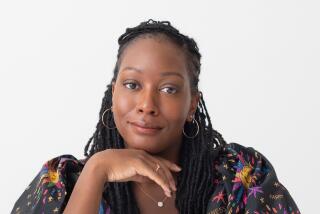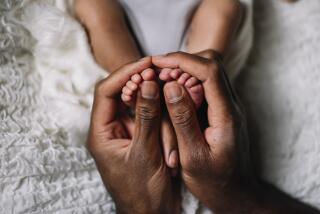A grandmother’s work
- Share via
NEW YORK — Each day at 5 a.m., Denise Peace rises and begins the task of waking and feeding five grandchildren, ages 2 to 17, and shepherding them out the door of her cramped but miraculously neat apartment in Brooklyn.
The 5-year-old needs to be on his school bus by 6:26. The eldest has to catch a 7 a.m. train. The 4-year-old must be walked to school in time for the 8:10 bell. The 2-year-old plays while Peace prepares the 3-year-old for day care. In the early afternoon, she reverses the drill, fetching children from bus stops and schools and getting them home for dinner, baths and bed. Peace collapses about 9 p.m.
“Then I just start all over again,” the 56-year-old said of the moment when her alarm sounds the next morning.
It’s a routine that changes once a month, when Peace travels to a Brooklyn church and meets with dozens of other grandmothers -- and some great-grandmothers -- in similar situations. All have been catapulted back into full-time parenting by the sudden losses of their own children. All have been brought together by the New York Police Department and local clergy for a chance to swap stories, compare legal and parenting advice, cry on a friendly shoulder, pray and simply let off steam.
“It comforts you. It lets you know you’re not alone in this,” said Peace, who learned of the close-knit group called Grandmothers LOV -- for Love Over Violence -- as she searched for programs last year to help women like herself. “They have your back. It’s like another family.”
It’s a family that is growing. According to the 2010 census, the number of grandparents who are primary caregivers to grandchildren has risen 12.8% since 2000, from about 2.4 million to more than 2.7 million. Between 1990 and 2000, census figures indicate that the number of U.S. children being raised by grandparents rose 30%. And the Annie E. Casey Foundation, which studies children’s issues, says that in 1970, 3.2% of U.S. children lived in grandparent-run households; by 1997, it was 5.5%.
With today’s grandparents -- particularly grandmothers -- living longer and often staying healthier, they are more likely to be able to step in if parents die or are unable to raise their children because of illness, incarceration, drug abuse or other problems. The recession is believed to have played a role in the increase, with grandparents more apt than many parents to have the financial stability needed to raise children, said Robert Geen, the Annie E. Casey Foundation’s family services policy director.
“I think there is a concern that the tough economic environment is putting pressure on parents -- that it is simply overwhelming them,” Geen said. “The big concern is that our social services system is completely oriented toward a nuclear family, so support available to grandparents is fairly lacking.”
Joanne Jaffe, the housing chief for the New York Police Department, had noticed how many grandmothers were becoming the anchor for disjointed families. LOV, which first met in September 2010, evolved from her observations, and from Police Commissioner Raymond Kelly’s work with Brooklyn clergy to combat youth violence.
Jaffe focused on grandmothers -- not grandfathers -- for several reasons. Among them: far more grandmothers than grandfathers are thrust into parenting roles because they often have more time, experience and willingness than men of their generation to rear their children’s children. Jaffe wanted to empower those women to become leaders in combating violence and other problems in their communities.
“It’s a giant family therapy group,” Jaffe said recently as LOV members trickled into the Mt. Sion Baptist Church, on a busy corner near a loud highway overpass. There were women leaning on walkers and on canes, and at least one in a wheelchair. Another came with a squirming toddler in her arms.
There were squeals of joy and cries of “Welcome back!” as the women who had not seen each other in eight weeks -- the group had taken a summer hiatus -- huddled like giddy teenagers. For the next 21/2 hours, with their grandchildren and great-grandchildren in day care, at school, or being cared for by baby-sitters or other family members, they could focus on themselves and one another.
Inez Rodriguez said she had canceled hip and knee replacement surgery to come to the gathering. Daphne Georgalas lamented the challenge of resting babies on her tired shoulders. “I thought I was done -- and lo and behold I have little Princess Emily now,” she said of her infant granddaughter.
Jaffe, whose NYPD uniform was in sharp contrast to the colorful dresses and hats worn by many of the grandmothers, made a point not to sound too cheery as she greeted the crowd. Instead, she alluded to the city’s bloody summer, when shootings left several children and teenagers dead and wounded in the very neighborhoods that many of the grandmothers call home, and hope to change by keeping their own grandkids out of trouble.
“I’m not going to say it was a wonderful summer. I’m not coming here saying it’s been a wonderful year,” Jaffe said as cries of “Amen” and knowing “Uh-huhs” filled the room.
As police officers in uniform dished out a hot buffet breakfast, the women began catching up with one another. One of them was Carolyn Faulkner, a slender 74-year-old, who raised two grandchildren, now 21 and 19, and is now raising a third -- a 10-year-old girl.
“Between running to school and going to PTA meetings, it’s a lot of work, but you know what they say to me?” she said of her grandchildren. “ ‘Thanks, Grandma.’ That’s more than money can buy.”
Faulkner says she stepped in to care for her eldest daughter’s three children when it became clear their mother was not up to the task.
“She didn’t do drugs or anything. She just didn’t grow up,” said Faulkner, who with her husband of 50 years has run a wedding planning business among other enterprises, and who sits on her neighborhood’s community board.
Asked when she gets time to herself, another grandmother cracked, “When she’s on jury duty.”
Peace knows the feeling. A relative newcomer to LOV, she remained quiet for most of the gathering, but opened up a couple of days later at her three-bedroom apartment. Plans to move into a smaller, cheaper place changed on Oct. 21, 2011.
That day, Peace’s 34-year-old daughter, Zurana Horton, was walking one of her children home from elementary school when gunfire erupted. When it stopped, Horton lay dead, the unintended victim of a gang shootout.
“I had to start all over again,” said Peace, a former home healthcare aide who learned of her daughter’s death while watching the news.
“For some reason, I knew it was her,” she said of the moment she saw the body of a woman covered in a sheet lying on a bloodied sidewalk. Peace quit her job, put aside thoughts of a smaller apartment, and took responsibility for Horton’s children -- all 12 of them, with two different fathers, who ranged in age from 1 to 18. Seven eventually moved in with their fathers.
She relies in part on her savings and on public assistance -- including food stamps, a subsidized apartment, and benefits paid to the five children living with her -- but hopes to return to work part time in January before her savings are depleted. She’s also hoping the city will help her move to a larger apartment to better accommodate the children as they grow.
The youngest now is 2-year-old Neiyma. The oldest living with her is 17-year-old Tyquran. Sitting at a table in her living room, she struggled to name all 12, as she kept an eye on Neiyma and her sister, 3-year-old Saya.
“I did pretty good,” she said with a laugh after finally getting through all the names with the help of some photographs.
The little girls sat at a pink, Cinderella-themed kids table playing with toy laptop computers as Peace described her typical day, which sometimes includes getting out of bed late at night to finish whatever task couldn’t be accomplished earlier.
Peace, who manages to remain upbeat, knows many people question why her daughter bore so many children. Peace, who also lost two sons to gun violence over the years, wonders the same.
“I think back in time and wonder what we could have done to avoid all of this. Maybe if I’d done things differently,” Peace said. She knows many people who look at her family’s history will be skeptical of her ability to raise her grandchildren.
But Geen said studies show that children placed with grandparents or other relatives do better than children placed with strangers, even if those grandparents have reared children with questionable judgment. “Many of these grandparents had kids at a very young age. They are very different people in their 50s and 60s than they were in their 20s,” Geen said.
Peace, who has lived in her apartment for 31 years, has one wall devoted to family pictures. On another hangs a certificate from Kelly, the police commissioner, in recognition of her commitment to raising her grandchildren.
“I gotta do what I gotta do,” Peace said cheerfully as she got ready to head out the door to pick up 4-year-old Shaniya from school.
--
More to Read
Sign up for Essential California
The most important California stories and recommendations in your inbox every morning.
You may occasionally receive promotional content from the Los Angeles Times.














